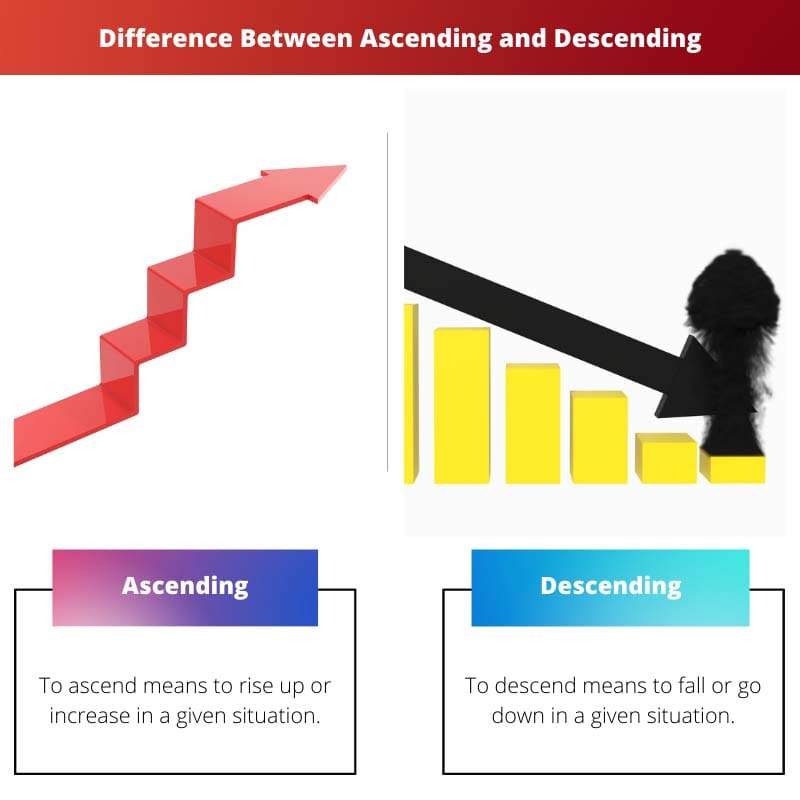Ascending and descending are the orders we describe going up or down the ladder of an event.
Key Takeaways
- Ascending refers to an upward movement or progression while descending indicates a downward movement or decline.
- In the context of numbers or lists, ascending order means arranging items from the smallest to the largest, whereas descending order means organizing them from the largest to the smallest.
- Understanding the difference between ascending and descending is crucial for various applications, such as mathematics, data analysis, and music.
Ascending vs Descending
The difference between ascending and descending is that ascending refers to going up, climbing up, or moving ahead of a given event. In contrast, descending means going down, climbing down, or moving backwards the path of a given event. Both these words function within the same sphere, but their actions are opposite.

Ascending precisely means rising in a given order, for example, going from A to B, B to C, or 1 to 2, 2 to 3 etc. It means moving ahead in the path.
On the other hand, Descending means falling is going down in a given order, for example, going from C to B, B to A, or 3 to 2, 2 to 1, etc. Both orders describe movement in the exact opposite direction.
The ordering of characters is proportional to the numbers or measurements presented within the group for classification. Ascending refers to an increase in size or amount, inflation, while descending is a decrease in size or value of the prescribed set of measurements, deflation.
These two terms are the exact opposite of one another; they are antonyms. They refer to the same concept or idea at a given time but highlight the opposite action or end result, the extremes of both situations.
Also, note that climbing is a good comparative activity in this connotation because climbers may ascend or descend a mountain slope. Synonyms for ascending can be a climb, move ahead, increase, inflate, raise, elevate, etc.
Synonyms for descending can be, drop, fall, downwards, sink, decrease, deflate, etc.
Comparison Table
| Parameters of Comparison | Ascending | Descending |
|---|---|---|
| Origin | It comes from the word “ascent.” | It comes from the word “descent.” |
| Definition | To ascend means to rise or increase in a given situation. | To descend means to fall or go down in a given situation. |
| Direction | The upward mobility of the event. | The downward mobility of the event. |
| Examples | Going from A to B or 1 to 2. | Going from B to A or 2 to 1. |
| Synonyms | Increase, raise, elevate, move ahead, etc. | Downfall, deflate, decrease, drop, sink, etc. |
What does Ascending Mean?
Ascending refers to climbing up or moving ahead in the order prescribed to the characters of the event or increasing in size or inflation of the situation at hand. To ascend, in literal terms, translates to climb up or rise.
Mountain climbers use the term ‘ascending’ when scaling the heights of a cliff or mountain range, which means they are moving upwards. Ascend also can be used metaphorically in a sentence structure, for example, “The ascent of the human soul from the corporal body” here, it means that the human soul is going up or rising above from the reaches of the tangible human body.
Lastly, ‘ascending’ can be used in mathematics to teach children the ascending order of numbers. For example, going 1 to 2, 2 to 3, 3 to 4, this gradual rise in numbers can be termed an ascending order of numbers.

What does Descending Mean?
Descending refers to climbing down or moving downwards in the order prescribed to the characters of an event. It is the downward mobility of the event decrease in size or deflation of the situation at hand.
To descend in literal terms translates to climb down or fall. Mountain climbers, aeroplane pilots, or even divers use the term ‘descending’ when scaling the depths of a cliff, mountain range, or sea, which means they move downwards.
For pilots, it can mean the plane is about to land or land. Descend also can be used metaphorically in a sentence structure; for example, “The descent of angels from the skies on the day of judgement” here means that the angels have come down from the sky above to the human world.
Lastly, ‘descending’ can be used in mathematics to teach children the descending order of numbers. For example, going 2 to 1, 3 to 2, 4 to 3, this gradual fall in numbers can be termed a descending order of numbers.

Main Differences Between Ascending and Descending
- Ascending comes from the word “ascent”, whereas descending comes from “descent”.
- To ascend means to rise or increase in a given situation. To descend means to fall or go down in a given situation.
- The mobility is upward while ascending. The mobility is downwards while descending.
- An ascending example can be going from A to B or 1 to 2. An example of descending can be going from 2 to 1 or B to A.
- Synonyms of ascending can be climbing, moving ahead, increasing, inflating, rising, elevating, etc. Synonyms for descending can fall, drop, downfall, moving downwards, sink, decrease, deflate, etc.





